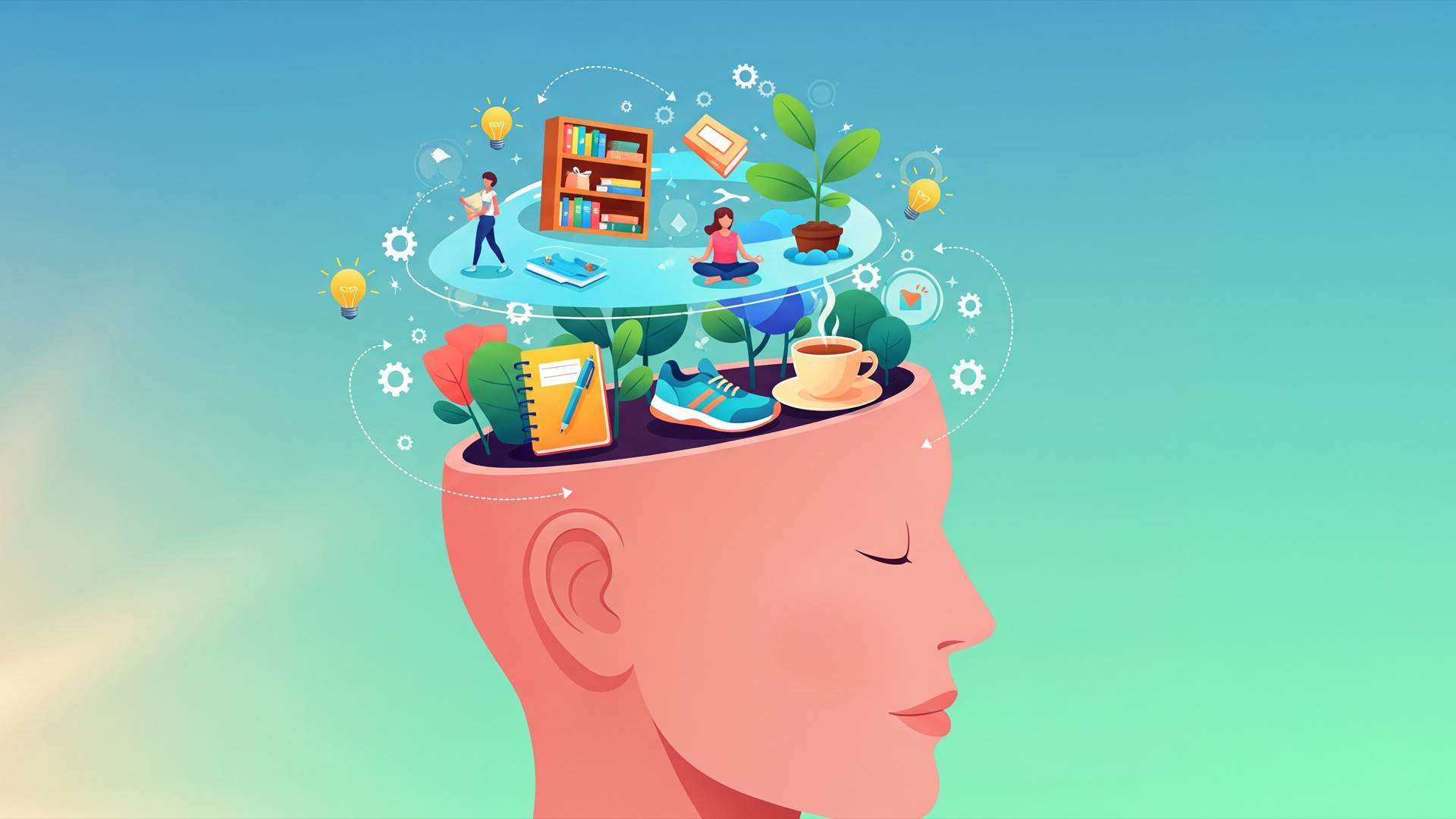Heutzutage glauben viele Menschen, ihr Gedächtnis zu verlieren, Namen zu vergessen, Dinge zu verlegen oder Details zu vergessen. Doch meist handelt es sich nicht um echten Gedächtnisverlust; es liegt einfach am Chaos des Alltags, wie Stress, sozialen Ängsten oder dem Jonglieren mit zu vielen Aufgaben. Die gute Nachricht: Mit schnellen, täglichen 10-minütigen Gewohnheiten können Sie Ihr Gedächtnis auf natürliche Weise verbessern.
Studien zeigen, dass regelmäßiges Training die Größe des Hippocampus um bis zu 2 % vergrößern und so das Gedächtnis verbessern kann (Erickson et al., 2011). Eine andere Studie ergab, dass Achtsamkeitsübungen das Arbeitsgedächtnis innerhalb weniger Wochen um 9 % steigern (Mrazek et al., 2013). Diese einfachen, wissenschaftlich fundierten Gewohnheiten, darunter Denkspiele und Achtsamkeitsübungen, lassen sich problemlos in Ihren Alltag integrieren – egal, ob Sie studieren, arbeiten oder einfach nur Ihren Verstand schärfen möchten.

Warum diese Gewohnheiten das Gedächtnis und die Merkfähigkeit verbessern
Jede Gewohnheit ist darauf ausgelegt, Ihr Gehirn auf einzigartige Weise zu stimulieren – vom Aufbau neuer neuronaler Verbindungen durch Denkspiele bis hin zum Stressabbau durch Achtsamkeitsübungen, die Ihre Konzentration schärfen. Wissenschaftlich belegt, sind diese Aktivitäten leicht täglich durchzuführen und liefern mit der Zeit spürbare Ergebnisse. Sie helfen Ihnen, Informationen zu behalten und unabhängig von Ihrem Lebensstil fokussiert zu bleiben.
Spielen Sie ein schnelles Denkspiel
- Warum es funktioniert: Rätsel und Spiele stärken die Verbindungen im Gehirn und helfen Ihnen, sich besser zu erinnern.
- So geht's: Arbeiten Sie mit Sudoku, Kreuzworträtseln oder Apps wie Lumosity. Beginnen Sie mit einem Puzzle und wechseln Sie dann zu einem Memory-Spiel, um Ihre Problemlösungs- und Erinnerungsfähigkeiten herauszufordern.
- Tipp: Probieren Sie jede Woche ein neues Spiel aus, um Ihr Gehirn fit zu halten.
Verwenden Sie aktives Erinnern und Wiederholen
- Warum es funktioniert: Sich selbst ohne Hinweise zu testen, baut stärkere Gedächtnisbahnen auf (Roediger & Karpicke, 2006).
- So geht's: Erinnern Sie sich an Fakten wie Namen oder Lektionen aus Ihrem Tag. Schreiben Sie 10-15 Dinge auf, die Sie sich merken möchten, testen Sie sich selbst und wiederholen Sie sie anschließend mit Karteikarten oder einer App wie Anki, um Ihr Gedächtnis zu verbessern.
- Tipp: Sehen Sie sich das Material später am Tag noch einmal an, um es zu festigen.
Übe Achtsamkeitsmeditation
- Warum es funktioniert: Achtsamkeitsübungen lindern Stress und stärken den Hippocampus, das Gedächtniszentrum Ihres Gehirns, wodurch Konzentration und Merkfähigkeit verbessert werden.
- So geht's: Konzentrieren Sie sich an einem ruhigen Ort auf langsames Atmen: 4 Sekunden einatmen, 4 Sekunden anhalten, 6 Sekunden ausatmen. Führen Sie dann einen Körperscan durch und achten Sie auf Empfindungen in Ihren Händen oder Schultern.
- Tipp: Verwenden Sie zur Strukturierung einen Timer oder eine geführte Meditation auf YouTube.

Probieren Sie NeuroVIZR für das Gedächtnis aus
- Warum es funktioniert: NeuroVIZR nutzt Licht und Ton, um die Gehirnaktivität anzuregen und die Neuroplastizität zu nutzen, um das Gedächtnis zu verbessern (Siever, 2007).
- So geht's: Folgen Sie den Licht- und Tonmustern einer NeuroVIZR-Sitzung über die App. Kombinieren Sie dies mit tiefem Atmen und konzentrieren Sie sich dann auf die visuellen Muster, um die Konzentration zu steigern.
- Tipp: Verwenden Sie es täglich für den besten Gehirnschub.

Verwenden Sie Ihre nicht dominante Hand
- Warum es funktioniert: Durch die Verwendung Ihrer nicht dominanten Hand werden neue Gehirnbahnen aktiviert, wodurch Ihr Geist flexibler wird.
- So geht's: Putzen Sie Ihre Zähne, schreiben Sie einen kurzen Absatz und essen oder zeichnen Sie mit Ihrer nicht dominanten Hand. Wechseln Sie dabei die Aufgaben, damit es spannend bleibt.
- Tipp: Beginnen Sie mit einfachen Aufgaben, um Vertrauen aufzubauen.
Trinken Sie viel und essen Sie clever
- Warum es funktioniert: Dehydration vernebelt Ihr Gehirn, während Wasser und gehirngesunde Snacks wie Nüsse oder Beeren es scharf halten.
- So geht's: Trinken Sie langsam ein Glas Wasser, essen Sie dann eine kleine Handvoll Walnüsse oder Blaubeeren und denken Sie darüber nach, wie Sie sich fühlen.
- Tipp: Halten Sie für die Beständigkeit eine Wasserflasche und Snacks bereit.
Überprüfen und reflektieren
- Warum es funktioniert: Wenn Sie das Gelernte aufschreiben, wird es besser in Ihrem Gedächtnis verankert.
- So geht's: Schreiben Sie 3–4 Sätze über die wichtigsten Momente oder Lektionen Ihres Tages, z. B. „Ich habe gelernt, wie Bewegung das Gedächtnis stärkt“, und gehen Sie dann frühere Notizen durch oder fügen Sie Details hinzu.
- Tipp: Überprüfen Sie Ihre Notizen wöchentlich, um sie zu festigen.
Erstellen Sie anschauliche Visualisierungen
- Warum es funktioniert: Mentale Bilder erleichtern das Erinnern von Fakten.
- So geht's: Wählen Sie 3-4 Elemente aus, z. B. Namen oder Konzepte, und erstellen Sie zu jedem ein lebendiges Bild. Beispiel: Stellen Sie sich für „Lisa“ eine Pizza mit ihrem Gesicht vor.
- Tipp: Gestalten Sie die Bilder wild und bunt, damit sie besser in Erinnerung bleiben.
Bewegen Sie sich körperlich
- Warum es funktioniert: Bewegung leitet mehr Sauerstoff an Ihr Gehirn und verbessert so Gedächtnis und Konzentration.
- So geht's: Machen Sie leichte Übungen wie Stretching, Tanzen oder einen flotten Spaziergang. Kombinieren Sie Armkreise, Ausfallschritte und Balance-Posen wie das Stehen auf einem Bein.
- Tipp: Spielen Sie Musik, damit es Spaß macht.
Die Verbesserung Ihres Gedächtnisses dauert nicht Stunden. Schon eine zehnminütige Gewohnheit am Tag kann Ihr Gedächtnis verbessern. Von Denkspielen über NeuroVIZR bis hin zu Achtsamkeit – diese wissenschaftlich fundierten Praktiken passen in jeden Terminkalender. Konsequenz ist entscheidend: Wählen Sie eine Gewohnheit, bleiben Sie dabei, verfolgen Sie Ihren Fortschritt und wechseln Sie die Dinge, damit es Spaß macht. Beginnen Sie noch heute und Sie werden bald ein besseres Erinnerungsvermögen, eine bessere Konzentration und einen stärkeren Geist feststellen.
Quellen:
- Erickson, KI, et al. (2011). Körperliches Training vergrößert den Hippocampus und verbessert das Gedächtnis. Proceedings of the National Academy of Sciences, 108(7), 3017-3022.
- Mrazek, MD, et al. (2013). Achtsamkeitstraining verbessert die Arbeitsgedächtniskapazität und die GRE-Leistung. Psychological Science, 24(5), 776-781.
- Roediger, HL, & Karpicke, JD (2006). Die Macht des Gedächtnistests: Grundlagenforschung und Implikationen. Perspektiven der psychologischen Wissenschaft, 1(3), 181-210.
- Siever, D. (2007). Audiovisuelle Synchronisation: Geschichte und physiologische Mechanismen. Biofeedback, 35(2), 53-58.



Erholungstechniken für Spitzensportler: Schlaf, Herzfrequenzvariabilität und NeuroVIZR
Praktische Strategien zur Optimierung der neuronalen Kritikalität im Alltag